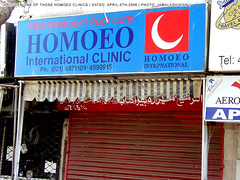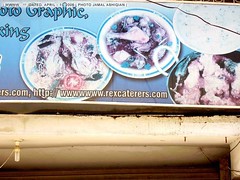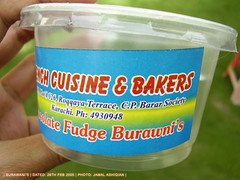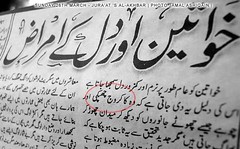Adil Najam
A couple of people have emailed to remind me that we have not had a post on Pinglish for a while. Maybe I got scared by sabizak’s reminder (here) that I should be more careful in my determination of what is or is not Pinglish. Must confess that I am still not sure what it is, even thought I offered a provisional definition of Pinglish (here); of course, this is very closely related to Hinglish. (More Pinglish posts here).
So, off I went in search of a better understanding of this thing I was calling Pinglish. What I found – hidden deep inside the crevasses of the Internet – was a delightful post on a forum called CyberMurid by someone going by the name bandali under the title ‘Pinglish, Urdish or Engdu.’ (Addition: Although I had originally found this material at the said website, we have since been informed that much of this material was part of an articel by Dr. Rauf Parikh in Dawn magazine, March 10, 2002.)
Here are the ‘techical essentials’:
A prominent feature of ‘Pinglish’ in the use of obsolete (in some cases even archaic) words and expressions. Local coinage is quite common. In some cases, this local coinage, though it may occasionally sound legitimate, would be incomprehensible or even hilarious to native ears. Sometimes, the local variety of the language sounds bookish (they ‘felicitate’, they don’t ‘congratulate’), too formal (‘do the needful’, for instance) or even ‘Un-English’. Many terms and phrases used in this part of the world are not part of the English language but have rather been ‘concocted’ and packed in a phrase-like expression. For example: pin-drop silence, cousin-brother, cutpiece and out of station (away from one’s home town). Grammatical liberties are quite interesting and pronunciation poles apart from what is known as RP (received pronunciation).
The writer goes on to give a hilarious list of examples. many of these are not ‘wrong,’ they are things that you will hear in Pakistan but those outside of our region may not understand them the way we do. Let me just share a few:
 ‘What is your good name’?
‘What is your good name’?
This may sound strange to the native ears since this is literal translation of ‘Ism-i-sharif’ in Urdu.
‘How is your good self?’
This also has a ring of Urdu. Perhaps ‘mizaj sharif’ translated.
Hotel:
It refers to an eatery as well as to any place meant for boarding and lodging. [ATP: Many of us still say ‘hotal meiN khana khana’ when we really mean restaurant].
Colony:
Forget colonialism and imperialism; in ‘Pinglish’ this refers to a large area comprising of residential blocks, for instance: Jinnah Colony, People’s Colony, Shah Faisal Colony, etc.
Cheater:
Used in colloquial Urdu (and local ‘English’, too) instead of ‘cheat’.
Bearer:
A waiter.
Affectee:
In desi English this means ‘someone affected,’ but it is not to be found in the dictionary (English dictionary, that is).
Cent percent:
Used instead of ‘a hundred per cent’ (‘per’ and ‘cent’ are put together).
Moot:
Used by some local newspapers instead of ‘meeting’.
Optical:
Used (especially by shops) in place of ‘eye glasses’.
Nullah:
Ravine; usually buses fall into ‘nullahs’ and ‘khuds’.
Dacoit:
A robber, perhaps from Urdu dakait.
Cutpiece:
A small, leftover piece of cloth; a local coinage. [ATP: See our ganderi discussion here and here].
Diggy:
The trunk of a car.
Black money:
Refers to money amassed through unfair means; another local usage, perhaps a literal translation of kala dhan
Toast:
A slice of bread whether toasted or not.
Kutcha:
Made of mud or clay, for example, a kutcha road, a kutcha house. Antonym is pucca.
Peon:
The dictionary says peon means a day-labourer; in India it meant a foot-soldier. But now, in Pakistan and India, it means ‘a messenger or office boy’.
 Eve-teasing:
Eve-teasing:
Sexual harassment.
Keep fast:
Instead of ‘fast’ (for roza); literal translation from Urdu.
Give exam:
Instead of ‘take exam’; literal translation from Urdu.
New, new things:
Literal translation from Urdu involving repetition of adjectives, such as ‘big, big cars’.
All of the original post if very well written and, importantly, is not trying to poke fingers at anyone:
This scribe is very much part of the mundane majority of Pakistanis that uses desi
At a more substantive level, bandali offers this useful and informative analysis:
Some linguists believe that a kind of ‘indigenization’ does occur when the speakers of other languages use a particular language and, according to them, when a language is used as a foreign language some ‘deviation’ may take place (because of the local milieu) and this ‘deviation’ should not be termed as a ‘mistake’. Rather, linguists like to refer to such versions as ‘regional variety’.
I do agree with this point of view, but in the case of desi English, they are not deviations or even mistakes; sometimes these are downright atrocities. I feel that if somebody wants to take revenge on the British for what they did to us during the British Raj, they should think of some other and better ways – for instance, ‘exporting’ some of our politicians to the UK for good (it will, in turn, benefit our country as well).
Some linguists, Dr Tariq Rehman, for instance, are of the view that Pakistani English is the new regional variety of the language and, therefore, should be viewed as such; i.e., something like South-Asian English or African English. This may be true, but in some instances, the ‘Urduization’ of English reaches such lengths that it sounds something like ‘Urdish’ or ‘Engdu’.
P.S. I have been unable to locate bandali and this writeup was originally posted on CyberMurid in March 2002; If someone knows who bandali is please convey to him (I assume it is ‘him’ from the name) that he has fans at ATP.
P.P.S. The photographs are from Jamsh; look at them carefully and enjoy. His photo collection is at Flickr.com and who blogs here. More Pinglish posts here.
P.P.P.S. Since having posted this, we have been informed that much of the material we had found on the CyberMurid website (now no longer functional) was part of an article by Dr. Rauf Parih in Dawn magazine (March 10, 2002).





















































Dear Mr. Najam
It is interesting of an engineer to talk on matters of linguistic relevance. I should let you know, with all due respect, that this work should be left to the linguists. The Pakistani variety of English is called in fact, Pake. Linguists would not dare to write on the subject of engineering unless it is to provide definitions. I wonder how anyone can be so daring as to venture into the realms of a subject they have no qualifications or training on.
I agree that English and Asian language variants such as Pinglish, Urdish or Engdu are not uncommon forms of communication within in certain parts of Asia. However as frequently as these language variants may be used on a daily basis, due care and attention must still be applied when using Standard English within these regions. Official documents or public notices still need to read correctly in English. One way in achieving this is by using a language translation agency who translate any text from one language to another using language professionals. This ensures that the target language reads perfectly and does not stray into colloquial territory.
“gitter-mitter”, a quote from illustrious Madam Noor Jehan. Means, “attempts to” communicate in English.
“git-pit”, same as above, my old favorite. I am not sure where I heard it first, but I am quite sure it is older than me!
“Police Encounter” means he is dead during a shoot out with police (staged or otherwise). (Reminds me of Mr. Sahootra (?sp), (our math teacher of the distant school years) who used to say, “kaka jee, some are wise, others are otherwise!”)
“Playboy” used to mean a sportsman. (I loved this one growing up.)
“Bodybuilder” could either be a bodybuilder or a weightlifter.
“Pedestal” means a pedestal fan.
“Godown” is a warehouse.
“Urdu Speaking” those who migrated from India.
“A Punjabi” when in Punjab means someone from rural Punjab.
“Sindhi” means anywhere in Sindh but Karachi
“Kachi / Pakki Petition” Without or with court fees, respectively
“Stayed the recovery(or whatever)” Restraining order of the court for the recovery( or whatever).
“Teddy” (I am not sure how this one is spelled) Someone who wears skin tight clothes.
“You go, I come” Well, not much here, except that it is an abbreviated and a delightful way to say, ‘you go ahead, I will follow you soon’.
“Shooting” is not firing of guns but movie making.
“Class” education grade level.
“Practical” is a science experiment during school years.
“current conjuncture” current situation or circumstances.
“fought the election” contested in the elections.
“Cantt” is cantonment but not necessarily of military quarters and not temporary either.
“Chips Floor” Marbled floor (polished pieces).
“Take into confidence” held discussions.
“transparency” made public
“big brother or sister” older brother or sister.
“stand by” united and together
“to look into the ……” investigate
“some choice persons” few people (we like)
“certain elements in the…” few people (we do not like) in the ….
Nice post revealing a number of extracts from the Pakistani English. The topic is very interesting in that it reveals many aspects regarding the features of the PE which is used in the Pakistani context. The main issue is that in our country people use it in accordance with their own context whereas the basic principle for using second language is to know the conventions of society in ehich it is used. I am also conducting research on the topic “The Use of vocabulary in PE” . While I was collecting data for it I came across with an expression which was very very funny.
The politicians hurled “naked abuses” against each other. I thought of abuses as an entity which exist, sometimes, wearing clothes…….:)